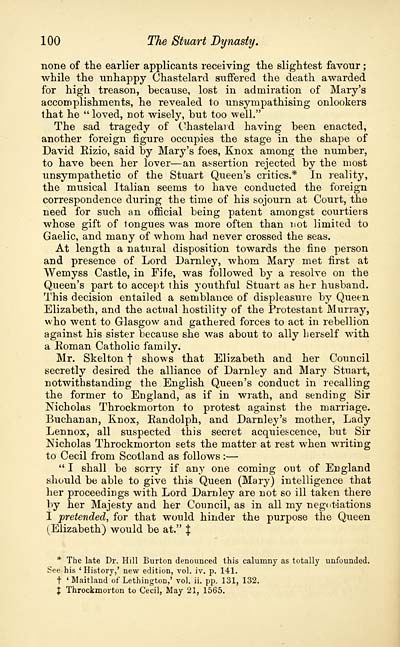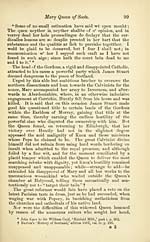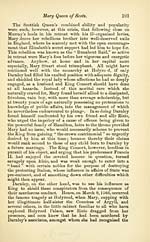Stuart dynasty
(120) Page 100
Download files
Complete book:
Individual page:
Thumbnail gallery: Grid view | List view

100 The Stuart Dynasty.
none of the earlier applicants receiving the slightest favour ;
while the unhappy Chastelard suffered the death awarded
for high treason, because, lost in admiration of Mary's
accomplishments, he revealed to unsympathising onlookers
that he " loved, not wisely, but too well."
The sad tragedy of Chastelard having been enacted,
another foreign figure occupies the stage in the shape of
David Eizio, said by Mary's foes, Knox among the number,
to have been her lover — an assertion rejected by the most
unsympathetic of the Stuart Queen's critics.* In reality,
the musical Italian seems to have conducted the foreign
correspondence during the time of his sojourn at Court, the
need for such an official being patent amongst courtiers
whose gift of tongues was more often than not limited to
Gaelic, and many of whom had never crossed the seas.
At length a natural disposition towards the fine person
and presence of Lord Darnley, whom Mary met first at
Wemyss Castle, in Fife, was followed by a resolve on the
Queen's part to accept this youthful Stuart as her husband.
This decision entailed a semblance of displeasure by Queen
Elizabeth, and the actual hostility of the Protestant Murray,
who went to Glasgow and gathered forces to act in rebellion
against his sister because she was about to ally herself with
a Roman Catholic family.
Mr. Skelton j shows that Elizabeth and her Council
secretly desired the alliance of Darnley and Mary Stuart,
notwithstanding the English Queen's conduct in recalling
the former to England, as if in wrath, and sending Sir
Nicholas Throckmorton to protest against the marriage.
Buchanan, Knox, Eandolph, and Darnley's mother, Lady
Lennox, all suspected this secret acquiescence, but Sir
Nicholas Throckmorton sets the matter at rest when writing
to Cecil from Scotland as follows : —
" I shall be sorry if any one coming out of England
should be able to give this Queen (Mary) intelligence that
her proceedings with Lord Darnley are not so ill taken there
by her Majesty and her Council, as in all my negotiations
I pretended, for that would hinder the purpose the Queen
(Elizabeth) would be at." J
* The late Dr. Hill Burton denounced this calumny as totally unfounded.
See his ' History,' new edition, vol. iv. p. 141.
t 'Maitland of Lethington,' vol. ii. pp. 131, 132.
J Throckmorton to Cecil, May 21, 1565.
none of the earlier applicants receiving the slightest favour ;
while the unhappy Chastelard suffered the death awarded
for high treason, because, lost in admiration of Mary's
accomplishments, he revealed to unsympathising onlookers
that he " loved, not wisely, but too well."
The sad tragedy of Chastelard having been enacted,
another foreign figure occupies the stage in the shape of
David Eizio, said by Mary's foes, Knox among the number,
to have been her lover — an assertion rejected by the most
unsympathetic of the Stuart Queen's critics.* In reality,
the musical Italian seems to have conducted the foreign
correspondence during the time of his sojourn at Court, the
need for such an official being patent amongst courtiers
whose gift of tongues was more often than not limited to
Gaelic, and many of whom had never crossed the seas.
At length a natural disposition towards the fine person
and presence of Lord Darnley, whom Mary met first at
Wemyss Castle, in Fife, was followed by a resolve on the
Queen's part to accept this youthful Stuart as her husband.
This decision entailed a semblance of displeasure by Queen
Elizabeth, and the actual hostility of the Protestant Murray,
who went to Glasgow and gathered forces to act in rebellion
against his sister because she was about to ally herself with
a Roman Catholic family.
Mr. Skelton j shows that Elizabeth and her Council
secretly desired the alliance of Darnley and Mary Stuart,
notwithstanding the English Queen's conduct in recalling
the former to England, as if in wrath, and sending Sir
Nicholas Throckmorton to protest against the marriage.
Buchanan, Knox, Eandolph, and Darnley's mother, Lady
Lennox, all suspected this secret acquiescence, but Sir
Nicholas Throckmorton sets the matter at rest when writing
to Cecil from Scotland as follows : —
" I shall be sorry if any one coming out of England
should be able to give this Queen (Mary) intelligence that
her proceedings with Lord Darnley are not so ill taken there
by her Majesty and her Council, as in all my negotiations
I pretended, for that would hinder the purpose the Queen
(Elizabeth) would be at." J
* The late Dr. Hill Burton denounced this calumny as totally unfounded.
See his ' History,' new edition, vol. iv. p. 141.
t 'Maitland of Lethington,' vol. ii. pp. 131, 132.
J Throckmorton to Cecil, May 21, 1565.
Set display mode to:
![]() Universal Viewer |
Universal Viewer | ![]() Mirador |
Large image | Transcription
Mirador |
Large image | Transcription
Images and transcriptions on this page, including medium image downloads, may be used under the Creative Commons Attribution 4.0 International Licence unless otherwise stated. ![]()
| Histories of Scottish families > Stuart dynasty > (120) Page 100 |
|---|
| Permanent URL | https://digital.nls.uk/94819206 |
|---|
| Description | A selection of almost 400 printed items relating to the history of Scottish families, mostly dating from the 19th and early 20th centuries. Includes memoirs, genealogies and clan histories, with a few produced by emigrant families. The earliest family history goes back to AD 916. |
|---|

